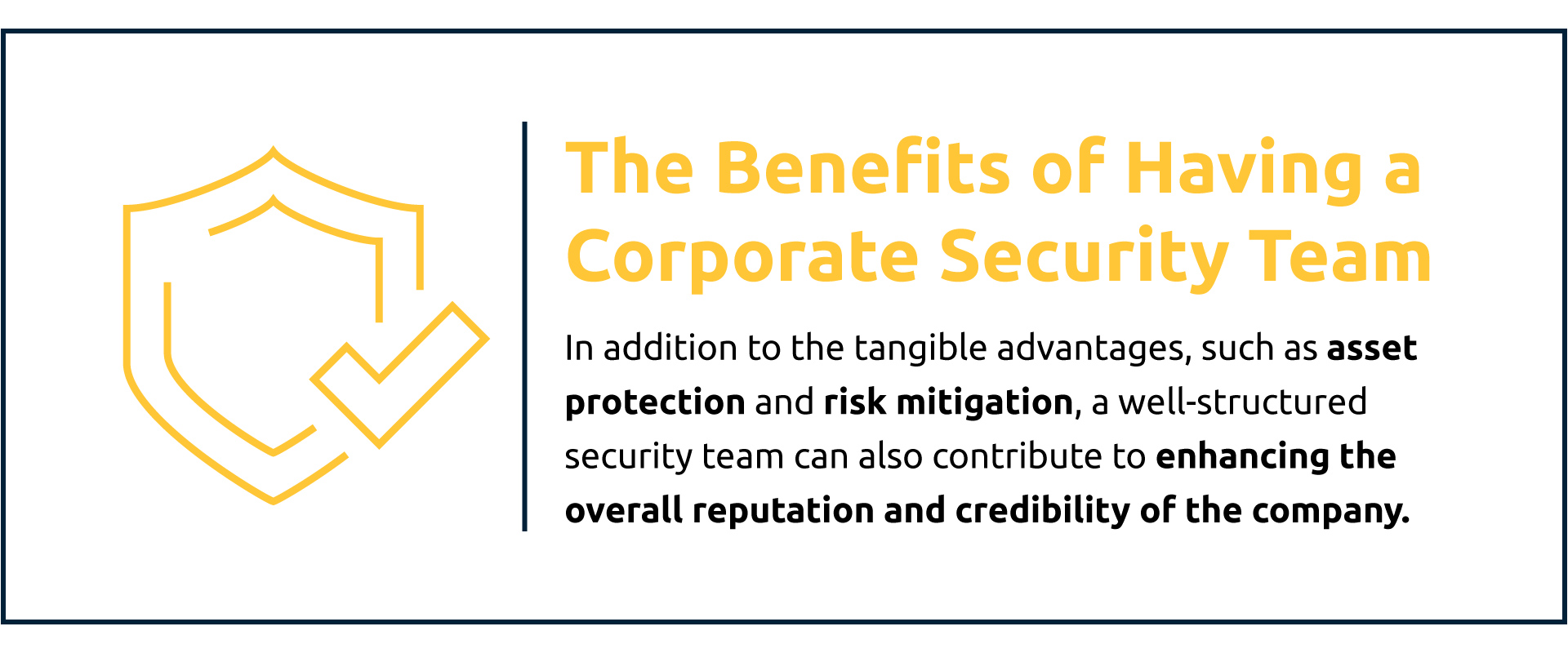In today’s fast-paced and ever-changing business landscape, corporate security has become a crucial aspect for companies of all sizes and industries. As threats continue to evolve and become more sophisticated, organizations need to have a dedicated corporate security team in place to safeguard their assets, protect their employees, and ensure business continuity.
In this article, we will explore the various aspects of corporate security and discuss why and when a company needs to establish a corporate security team.
 Understanding Corporate Security
Understanding Corporate Security
Corporate security encompasses the strategies, processes, and measures put in place to protect a company’s physical and intellectual assets, as well as ensure the safety of its employees. A corporate security team is responsible for identifying potential risks, mitigating threats, and implementing security measures to prevent unauthorized access or breaches.
The Role of a Corporate Security Team
A corporate security team plays a pivotal role in providing a safe and secure working environment for employees, clients, and customers. They are responsible for developing and implementing security policies and procedures that align with the company’s goals and objectives. Their primary objective is to proactively identify and address potential security risks to protect the company from financial losses, reputation damage, and legal consequences.
Key Functions of Corporate Security
The functions of a corporate security team may vary depending on the size and nature of the company, but they typically include:
- Security risk assessments and threat analysis.
- Developing and implementing security policies and procedures.
- Physical security measures, such as access control systems and surveillance.
- Information security, including data protection and cybersecurity.
- Emergency preparedness and response planning.
- Investigating and resolving security incidents and breaches.
One of the key aspects of corporate security is conducting security risk assessments and threat analysis. This involves identifying potential vulnerabilities and evaluating the likelihood and impact of various threats.
By understanding the risks, a corporate security team can develop effective strategies to mitigate them and minimize the potential impact on the company’s operations.
In addition to physical security measures, such as access control systems and surveillance, corporate security teams also focus on information security. This includes protecting sensitive data, both internally and externally, and implementing cybersecurity measures to prevent unauthorized access, data breaches, and other cyber threats.
With the increasing reliance on digital systems and technologies, information security has become a critical aspect of corporate security.
Emergency preparedness and response planning is another crucial function of a corporate security team. They develop comprehensive plans to address various emergency scenarios, such as natural disasters, fires, or security incidents.
These plans outline the necessary actions to be taken, communication protocols, and evacuation procedures to ensure the safety of employees and minimize potential damages.
Lastly, investigating and resolving security incidents and breaches is an essential function of a corporate security team. When incidents occur, such as theft, vandalism, or unauthorized access, the team conducts thorough investigations to identify the root cause, gather evidence, and take appropriate actions to prevent future occurrences.
This may involve collaborating with law enforcement agencies, conducting forensic analysis, and implementing additional security measures to prevent similar incidents in the future.
 Identifying the Need for Corporate Security
Identifying the Need for Corporate Security
Every company, regardless of size or industry, should assess its security needs. Identifying the need for a corporate security team involves understanding the potential risks and vulnerabilities specific to the organization.
Corporate security is a critical aspect of business operations, ensuring the protection of assets, employees, and sensitive information. Beyond physical security measures, such as surveillance cameras and access control systems, corporate security encompasses a holistic approach to safeguarding the organization from various threats.
Assessing Risk Levels in Your Company
A comprehensive risk assessment is the starting point for determining the need for a corporate security team. It involves identifying and evaluating potential threats and vulnerabilities that may affect the company’s operations, assets, and employees.
This assessment should consider both internal and external risks, such as physical security, information security, and regulatory compliance.
During a risk assessment, factors like the company’s geographical location, industry regulations, and past security incidents are taken into account to create a detailed risk profile. By analyzing these risk levels, organizations can prioritize security measures and allocate resources effectively to mitigate potential threats.
Recognizing Potential Threats and Vulnerabilities
Recognizing potential threats and vulnerabilities is crucial in understanding the necessity of a corporate security team. Threats can come in various forms, including theft, vandalism, workplace violence, cyberattacks, and natural disasters.
Vulnerabilities can arise from outdated security systems, lack of employee awareness, or inadequate security protocols. Identifying these threats and vulnerabilities helps determine the level of security measures required to mitigate the risks effectively.
With the increasing digitization of business operations, cybersecurity has become a prominent concern for companies. The rise of sophisticated cyber threats, such as ransomware and phishing attacks, underscores the importance of integrating cybersecurity measures into the overall corporate security strategy.
By staying vigilant and proactive in addressing cybersecurity risks, organizations can enhance their resilience against evolving digital threats.
 The Impact of Company Size and Industry on Security Needs
The Impact of Company Size and Industry on Security Needs
Company size and industry are significant factors that influence security needs. While every company faces certain security challenges, they can vary depending on the size and sector in which they operate.
Security Concerns in Different Industries
When it comes to industry-specific security concerns, the landscape can vary widely. For instance, a healthcare organization must contend with protecting sensitive patient data and complying with strict regulations like HIPAA, while a retail company may focus more on preventing cyber attacks on customer payment information.
The nuances of each industry demand tailored security strategies to mitigate risks effectively. Understanding the specific threats and compliance requirements within the industry helps tailor security measures accordingly.
Moreover, the geographical location of a company can also impact its security needs. Companies operating in regions prone to natural disasters or political instability may need to incorporate contingency plans and backup systems to ensure business continuity in the face of unforeseen events.
How Company Size Influences Security Requirements
The size of a company also plays a crucial role in determining the security requirements. Smaller companies may have limited resources but are not exempt from security risks. They must focus on prioritizing security measures based on their specific needs and budget constraints. Larger organizations, on the other hand, may have more complex security needs due to their size, multiple locations, and diverse operations.
Additionally, the human factor within a company cannot be overlooked when assessing security needs. Employee training and awareness programs are essential components of a robust security strategy, regardless of company size. Ensuring that staff members are well-informed about cybersecurity best practices can significantly reduce the risk of internal security breaches.
 The Benefits of Having a Corporate Security Team
The Benefits of Having a Corporate Security Team
Establishing a corporate security team brings various benefits to an organization, regardless of its size or industry. In addition to the tangible advantages, such as asset protection and risk mitigation, a well-structured security team can also contribute to enhancing the overall reputation and credibility of the company.
One significant benefit of having a corporate security team is the ability to respond swiftly and effectively to security incidents. These professionals are trained to handle emergencies, conduct investigations, and collaborate with law enforcement agencies when necessary. By having a dedicated team in place, companies can minimize the impact of security breaches and demonstrate a proactive approach to safeguarding their operations.
Protection of Physical and Intellectual Assets
A corporate security team ensures the protection of a company’s physical and intellectual assets, such as premises, equipment, inventory, and proprietary information. They implement security measures, such as access control systems, video surveillance, and employee training, to deter potential threats and mitigate security risks. By safeguarding these assets, organizations can maintain business continuity and avoid costly disruptions caused by theft, vandalism, or data breaches.
Ensuring Employee Safety and Confidence
Employee safety is a top priority for any company. A robust security program and the presence of a corporate security team provide employees with a sense of safety and confidence in their workplace. This fosters a positive work environment and enhances productivity and morale. Moreover, by investing in the well-being of their workforce, companies can attract and retain top talent, as employees are more likely to stay loyal to organizations that prioritize their security and well-being.
 Steps to Establish a Corporate Security Team
Steps to Establish a Corporate Security Team
Establishing a corporate security team involves careful planning and consideration of several factors. Security is a critical aspect of any organization, ensuring the protection of assets, information, and personnel. A well-structured security team is essential for mitigating risks, responding to incidents, and maintaining a secure environment for business operations.
Before diving into the establishment of a security team, it is crucial to conduct a comprehensive risk assessment to identify potential threats and vulnerabilities. This assessment serves as the foundation for developing security strategies and determining the resources needed to address security gaps effectively.
Hiring a Security Consultant vs Building an In-house Team
Companies can either hire a security consultant or build an in-house team to address their security needs. While hiring a consultant can provide specialized expertise, an in-house team offers greater control and continuity in security operations. The choice depends on factors such as budget, the complexity of security requirements, and long-term security goals.
Establishing an in-house team allows for the customization of security protocols to align with the organization’s specific needs and culture. It fosters a deeper understanding of internal processes and systems, enabling the team to proactively identify and address security risks.
Essential Skills and Qualifications for a Security Team
When building a corporate security team, it is essential to consider their skills and qualifications. The team should comprise individuals with expertise in areas such as physical security, cybersecurity, risk management, emergency response, and compliance. They should possess strong analytical, problem-solving, and communication skills to effectively manage security operations and collaborate with various stakeholders.
Furthermore, continuous training and professional development are crucial for keeping the security team updated on the latest security trends, technologies, and best practices. This ongoing education ensures that the team remains agile and adaptive in the face of evolving security threats and challenges.
 Maintaining and Evaluating Your Corporate Security
Maintaining and Evaluating Your Corporate Security
Establishing a corporate security team is not a one-time endeavor. Regular maintenance and evaluation of security measures are crucial to ensure their effectiveness and address emerging threats.
In addition to setting up a dedicated security team, it is important to establish a culture of security awareness throughout the organization. This involves providing regular training sessions for employees on best practices, conducting simulated security drills, and fostering a sense of responsibility among all staff members to uphold security protocols.
Furthermore, investing in the latest security technologies and tools is vital to staying ahead of potential threats. This includes implementing intrusion detection systems, encryption protocols, access control mechanisms, and security monitoring solutions. By leveraging cutting-edge technologies, organizations can bolster their defenses and mitigate risks effectively.
Regular Security Audits and Updates
Conducting regular security audits is essential to identify any weaknesses or gaps in existing security measures. This involves reviewing policies and procedures, testing systems and controls, and updating protocols to align with evolving threats and technology.
It is an ongoing process that helps organizations stay ahead in the changing security landscape. Moreover, collaborating with external security experts and industry peers can provide valuable insights and fresh perspectives on potential vulnerabilities that may have been overlooked internally.
Measuring the Effectiveness of Your Security Team
Measuring the effectiveness of a corporate security team is essential to gauge the efficiency of their efforts and identify areas for improvement. This can be done through metrics such as incident response time, incident resolution rate, employee satisfaction surveys, and feedback from relevant stakeholders.
By regularly assessing their performance, the security team can enhance their strategies and ensure continuous improvement. Additionally, fostering a culture of transparency and open communication within the security team can facilitate knowledge sharing and collaboration, leading to more robust security practices and better outcomes.
 Choose the Right Security Team for Your Business
Choose the Right Security Team for Your Business
The need for a corporate security team is clear for those that want to secure the safety of their employees, property, and customers. Companies of all sizes and industries face various security risks that can have severe implications on their operations, reputation, and bottom line.
By understanding the importance of corporate security, recognizing potential threats, and implementing robust security measures, organizations can safeguard their assets, protect their employees, and ensure business continuity in an ever-evolving threat landscape.
Reach out to ASAP Security now for any questions or if you need a quote.
We are proud of our stellar customer service record, so check our website for all the testimonials from our various satisfied customers. Call ASAP Security at 1-833-272-7247

 Understanding Corporate Security
Understanding Corporate Security Identifying the Need for Corporate Security
Identifying the Need for Corporate Security The Impact of Company Size and Industry on Security Needs
The Impact of Company Size and Industry on Security Needs The Benefits of Having a Corporate Security Team
The Benefits of Having a Corporate Security Team Steps to Establish a Corporate Security Team
Steps to Establish a Corporate Security Team Maintaining and Evaluating Your Corporate Security
Maintaining and Evaluating Your Corporate Security